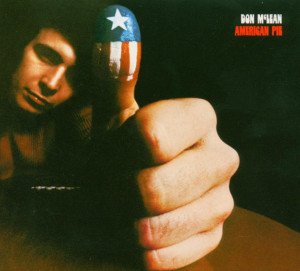Published on Apr 14, 1997
This is my father’s fault…
When I was a little boy, my dad would listen to an
adult-contemporary stattion, WFYR-FM, in Chicago (though it’s now a
rock station under different call letters). Sometmes, I would go
into his office at night with him, and when we would be coming
home, this station would play a song called “Vincent” by Don
McLean. Of course, they would also play the song that made his
career, “American Pie.”
When I got older, I went out and bought a copy of McLean’s
American Pie, listened to it, liked it… and forgot about
it.
I don’t know what possessed me to dig it out of the Pierce
Memorial Archives (where we’re having a 2-for-1 sale on Cubs
merchandise), but when I listned to it, I got angry…
I got angry at myself for not listening to such an incredible
album on an almost daily basis. But I also got mad at the music
industry for all but forgetting about McLean after this
masterpiece. (I was surprised to read on a few Don Mclean sites on
the Internet that he did have a charting hit in the early ’80s.)
This man was one of the best storytelling songwriters this country
has ever produced, and is still with us. We lost Jim Croce in 1973
and Harry Chapin in 1981, and while their work blows me away as
well, they seem to get more airplay than McLean.
I’m listening again to the album as I write this review – let’s
all get an education together…
Probably there has been no song in modern music (except for
“Louie Louie”) that has been analyzed and picked apart for messages
more than “American Pie.” Supposedly a song about rock and roll
from the death of Buddy Holly to the time the album was recorded in
1971, I have heard more theories about what this song is supposed
to represent than I can count. I am not willing to venture forth
into this argument; rather, I’d like to appreciate the song for
what it is. (McLean wrote to columnist Cecil Adams of “The Straight
Dope” fame when the meaning of the lyrics was posed to Adams:
“…long ago I realized that songwriters should make their
statements and move on, maintaining a dignified silence.”)
Just this song alone secured
American Pie a place in the annals of rock fame. But the
album is more –
much more – than the title track. The track “Vincent,” a
song about the life and trials of artist Vincent Van Gogh, is one
of the most beautiful songs I have
ever heard (and kids, that’s a long time). The sole
accompaniment of Warren Bernhardt’s piano on “Crossroads”
highlights McLean’s soft but powerful delivery.
And McLean is an incredibly talented guitarist as well. His
acoustic work on “Till Tomorrow” and “Vincent” echoes louder than
the reverb of any Stratocaster in existence. One listen to “The
Grave” will prove to you that McLean’s characters in his songs are
screaming for you to notice them – and when you do, look out,
’cause you’re about to be blindsided with a message that’s worth
learning. Wow!
But not all on
American Pie is just serious work. “Winterwood” is a sweet
love song that has a touch of country to it. “Everybody Loves Me,
Baby” is McLean and band letting loose in the studio, having fun
with the material.
The closing track, “Babylon,” is short but haunting – the use of
banjo and multi-layered harmony vocal tracks make this one errirly
powerful, and one you wish would go on for some time.
If McLean is bitter about not staying in the spotlight past the
hits on
American Pie, it didn’t show recently when I saw him
performing on cable’s Family Channel. Instead, it seems McLean
embraced that moment of fame and continued to enjoy performing it
while his audience reveled in hearing a song they loved. For that,
he is a better man than some artists I could name.
While
American Pie is one of the best albums I have ever listened
to, let us not forget that this is not the only work in McLean’s
discography. Enjoy the ten songs on this one, but let it serve as
the gate to discovering the rest of his catalog. Go back to
Tapestry, enjoy the folk roots of
Homeless Brother, go back to the ’50s for a moment with his
cover of “Since I Don’t Have You” on
Chain Lightning – just don’t stop at this one!
That’s why this is all my father’s fault – not only will I be
digging up other McLean albums from my local record store, but I
think my dad knows what he’ll be getting for Father’s Day.
